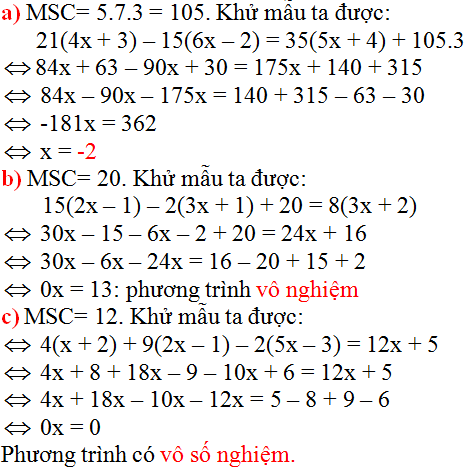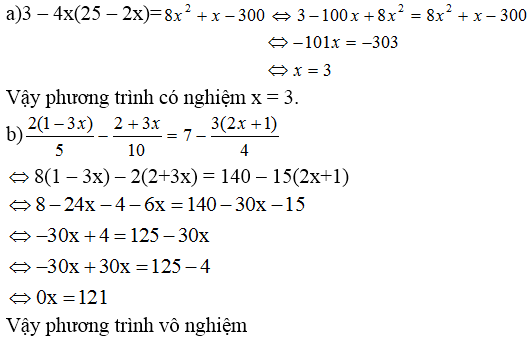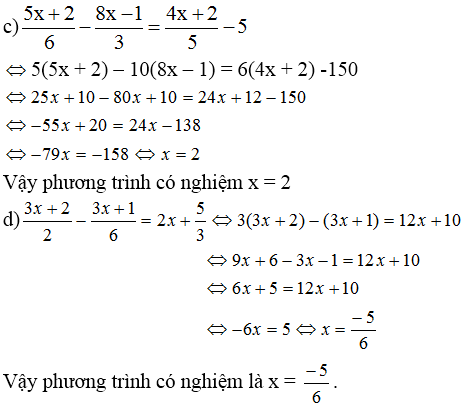Hãy nhập câu hỏi của bạn vào đây, nếu là tài khoản VIP, bạn sẽ được ưu tiên trả lời.

Mấy này bạn quy đồng lên cùng mẫu xong khử mẫu rồi giải. Dễ mà.

a: \(\Leftrightarrow4\left(x^2+60+17x\right)\left(x^2+60+16x\right)=3x^2\)
\(\Leftrightarrow4\cdot\left[\left(x^2+60\right)^2+33x\left(x^2+60\right)+272x^2\right]=3x^2\)
=>4(x^2+60)^2+132x(x^2+60)+1085x^2=0
=>4(x^2+60)^2+62x(x^2+60)+70x(x^2+60)+1085x^2=0
=>2(x^2+60)(2x^2+120+31x)+35x(2x^2+120+31x)=0
=>(2x^2+120+35x)(2x^2+31x+120)=0
=>\(x\in\left\{\dfrac{-35\pm\sqrt{265}}{4};-\dfrac{15}{2};-8\right\}\)
b: Đặt x^2-3x=a
Phương trình sẽ là \(\dfrac{1}{a+3}+\dfrac{2}{a+4}=\dfrac{6}{a+5}\)
\(\Leftrightarrow\dfrac{a+4+2a+6}{\left(a+3\right)\left(a+4\right)}=\dfrac{6}{a+5}\)
=>(3a+10)(a+5)=6(a^2+7a+12)
=>6a^2+42a+72=3a^2+15a+10a+50
=>3a^2+17a+22=0
=>x=-2 hoặc x=-11/3

chẳng ai giải, thôi mình giải vậy!
a) Đặt \(y=x^2+4x+8\),phương trình có dạng:
\(t^2+3x\cdot t+2x^2=0\)
\(\Leftrightarrow t^2+xt+2xt+2x^2=0\)
\(\Leftrightarrow t\left(t+x\right)+2x\left(t+x\right)=0\)
\(\Leftrightarrow\left(2x+t\right)\left(t+x\right)=0\)
\(\Leftrightarrow\left(2x+x^2+4x+8\right)\left(x^2+4x+8+x\right)=0\)
\(\Leftrightarrow\orbr{\begin{cases}x=-2\\x=-4\end{cases}}\)vậy tập nghiệm của phương trình là:S={-2;-4}
b) nhân 2 vế của phương trình với 12 ta được:
\(\left(6x+7\right)^2\left(6x+8\right)\left(6x+6\right)=72\)
Đặt y=6x+7, ta được:\(y^2\left(y+1\right)\left(y-1\right)=72\)
giải tiếp ra ta sẽ được S={-2/3;-5/3}
c) \(\left(x-2\right)^4+\left(x-6\right)^4=82\)
S={3;5}
d)s={1}
e) S={1;-2;-1/2}
f) phương trình vô nghiệm

a: =>5-x+6=12-8x
=>-x+11=12-8x
=>7x=1
hay x=1/7
b: \(\dfrac{3x+2}{2}-\dfrac{3x+1}{6}=2x+\dfrac{5}{3}\)
\(\Leftrightarrow9x+6-3x-1=12x+10\)
=>12x+10=6x+5
=>6x=-5
hay x=-5/6
d: =>(x-2)(x-3)=0
=>x=2 hoặc x=3



Câu 1:
a) \(x-\dfrac{5x+2}{6}=\dfrac{7-3x}{4}\)
\(\Leftrightarrow\dfrac{12x-2\left(5x+2\right)}{12}=\dfrac{3\left(7-3x\right)}{12}\)
\(\Leftrightarrow12x-10x-4=21-9x\)
\(\Leftrightarrow11x=25\)
\(\Leftrightarrow x=\dfrac{25}{11}\)
b) \(\left(3x-1\right)\left(x-3\right)\left(7-2x\right)=0\)
\(\Leftrightarrow\left[{}\begin{matrix}3x-1=0\Leftrightarrow x=\dfrac{1}{3}\\x-3=0\Leftrightarrow x=3\\7-2x=0\Leftrightarrow x=3,5\end{matrix}\right.\)
c) \(\left|3x\right|=4x+8\) (1)
Ta có: \(\left|3x\right|=3x\Leftrightarrow3x\ge0\Leftrightarrow x\ge0\)
\(\left|3x\right|=-3x\Leftrightarrow3x< 0\Leftrightarrow x< 0\)
Với \(x\ge0\), phương trình (1) có dạng:
\(3x=4x+8\Leftrightarrow-x=8\Leftrightarrow x=-8\)
(không thoả mãn điều kiện) \(\rightarrow\) loại
Với \(x< 0\), phương trình (1) có dạng:
\(-3x=4x+8\Leftrightarrow-7x=8\Leftrightarrow x=-\dfrac{8}{7}\)
(thoả mãn điều kiện) \(\rightarrow\) nhận
Vậy phương trình đã cho có 1 nghiệm \(x=-\dfrac{8}{7}\)
Câu 2:
\(2x\left(6x-1\right)\ge\left(3x-2\right)\left(4x+3\right)\)
\(\Leftrightarrow12x^2-2x\ge12x^2+9x-8x-6\)
\(\Leftrightarrow-3x\ge-6\)
\(\Leftrightarrow x\le2\)
Vậy bất phương trình đã cho có nghiệm \(x\le2\)